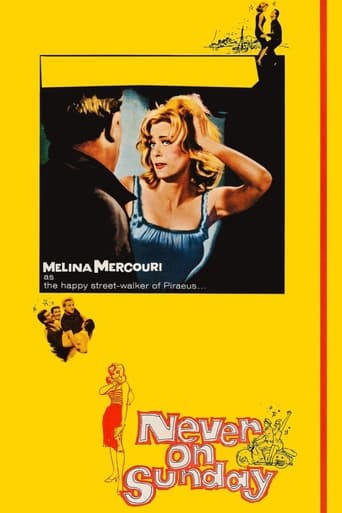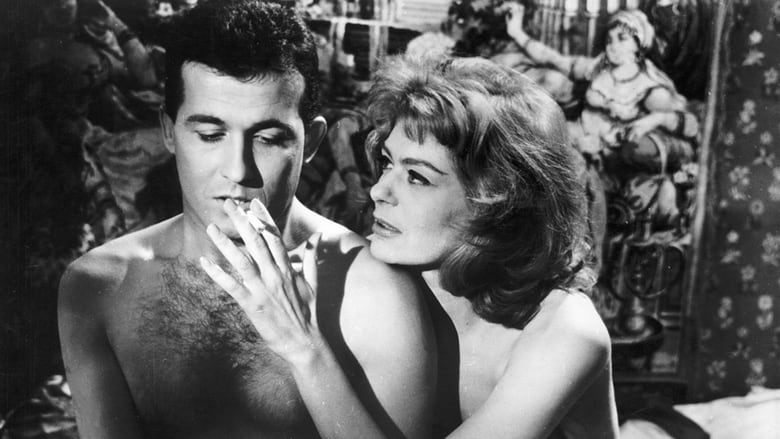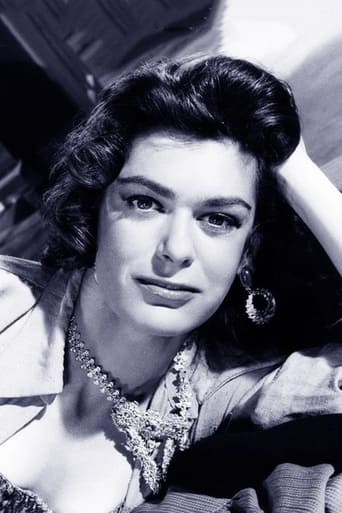Never on Sunday (1960)
An American scholar in Greece sets about improving the prostitute with whom he is infatuated.
Watch Trailer
Cast
Similar titles


Reviews
Wonderful character development!
Memorable, crazy movie
If you don't like this, we can't be friends.
How sad is this?
There's nothing quite like discovering a talent that you've never seen before. That's what I got from Melina Mercouri. Directed by her then fiancé Jules Dassin. Not classically beautiful but possessing a smile and a personality that could light up Chicago, Mercouri plays Ilya, a prostitute in a small Greek village of Piraeus who brings life and music to those around her. Surrounded by a small troop of male groupies, she is a fountain of joy and life.Into the picture comes Homer Thrace (Dassin), an American who is smart but does not possess a great deal of common sense. Watching her turn a local tavern into a place of life and music, he explains that he has become disillusioned by the sadness in the world and has returned to Greece, the cradle of civilization, in an attempt to discover what went wrong. Through this woman, brimming with happiness, he hopes to find out.Homer loves Ilya's spirit but he's troubled by her profession which he finds demeaning. He also finds it a little troubling that she reinterprets the Greek tragedies she attends, having misconceptions about Oedipus Rex. He asks for a little time to be alone with her, to educate her on the great philosophers who walked on the very same ground under her feet. He rearranges her apartment, giving her the books to educate her and trying to turn her toward Greek intellectualism. But, as we see, a little knowledge is a good thing but too much knowledge turns away the jollier sides of her personality. He doesn't realized it but by pruning her, he has cut away the bits of her mind that make her happy. She becomes modest and more serious . . . but not for long.Mercouri gives a performance of a character we don't see much in American films, the kind of person with a lust for life, the kind of person who absolutely lives to get out of bed in the morning. Her looks wouldn't get her work as a fashion model, but standing at the center of this film it is impossible to resist what she brings to the screen. When she dances, it isn't choreographed; it bubbles up from inside her. When we see her in the throng of men at the tavern, there is a reverence in their eyes. They don't see her as a sex object but more of a fountain of happiness; they respect her even though she engages in a profession that doesn't warrant it. There is a moment late in the film, a beautiful moment, when we see her in her apartment. She pulls out her record player and puts on Manos Hadjidakis's "Never on Sunday" and dances about her apartment like she is propelled by something wondrous. It is a moment when we see the seriousness that Homer had instilled in her, and the flower begins to bloom once more.
Greek film "Never on Sunday" is a perfect film for all those viewers who appreciate good cinema and have already seen films directed by Jules Dassin namely Rififi, Topkapi and Celui Qui Doit Mourir. Never on Sunday is a simple philosophical film with sufficient doses of light philosophical lessons. A philosophy professional would feel music ringing in his/her ears when the names and teachings of great Greek philosophers namely Socrates, Plato and Aristotle are uttered. The film's star cast includes director Jules Dassin who is paired against his wife Melina Mercouri, one of Greek cinema's best known actresses who was also active as the minister of culture in her native Greece. For 'Never on Sunday', the difficult subject of prostitution is treated in a non controversial, non didactic manner. In many ways this has become a weak point for the film as such a tough topic requires more attention both from director as well as audiences. Much of the film is based on the meditative curiosity which an American tourist displays regarding the profession of a practical harlot upon his arrival at the island of Piraeus, Greece. As the film was made in 1960s, a time of black and white films, there is virtually no skin show. Hence, one can go ahead and watch it with family members without bothering about any polemical content.
The plot resembles that of "Born Yesterday," in which an intellectual tries to reform a low-brow woman. Except that this is not about Judy Holliday but about Melina Mercouri, a Greek whore who likes her life style and believes that every story ends happily. The film is drenched in the Greek pop tunes of Manos Hatzidakis, so much so that it's almost a musical. For a while the theme song was heard everywhere. It's in black and white but no one should be put off by the infrequent subtitles.I was surprised to find I could understand some of the Greek. Years ago I had a class in the language. I don't like to brag but one day the class was reciting in unison some phrases that the instructor from Athens was trying to implant in our indolent brains and he interrupted the lesson. Pointing to me, he asked, "You -- you are Greek?" No. "Your parents, they are Greek?" No. "That's funny because you have a perfect Athenian accent." Later, after studying other languages, I found I had no talent for learning them at all. My talent was for imitating the voices of other people, like an impressionist. It had been the instructor who'd had the "perfect Athenian accent". Now, you may think that this anecdote has absolutely nothing to do with a review of the movie, but that's only because you aren't thinking about it enough. Give it some effort and -- well, it's pretty deep.Junes Dassin, the director and male lead, is Homer Thrace, the idealistic Grecophile who comes to Piraeus to discover what made the Ancient Greeks so hot, in hopes that, having found the answer, the whole unhappy world of 1960 can be transformed. The greatest pleasure, said Socrates, Plato, and Aristotle, is found in the exercise of the mind. Dassin takes Mercouri under his tutelage for two weeks and tries to transform her, to persuade her to shed her Jungian sensation-type ways and get with the usual program -- Bach's cello solos, Picasso, the climate of Iceland.He's got a tough job. Mercouri has a way of keeping herself happy no matter what's going on. She loves to see performances of "Medea," a terrible tragedy about a jealous, bitchy wife who slaughters her own children out of spite. In Mercouri's interpretation, Medea was lying about the murders just to get her husband's attention. "Oedipus Rex" is a happy play because it's about a man's love for his mother. Everything always ends happily and "they all go to the sea shore." At times it's very amusing.In the end, Dassin is defeated by Mercouri and the other whores who line the streets of Piraeus, as in fact they did at the time. Dassin loses his expression of awe, gets drunk, does a silly dance with the others in the tavern and shouts at Mercouri, "You're beautiful -- but you're dumb." She's not really so dumb. After all, she belongs to an established cinematic genre -- the happy peasant. The movies are full of them. Nationality doesn't count. They all share the same habits. They're happy in their work (usually having something to do with the earth), they sing, they dance, they eat with gusto (al fresco, weather permitting), they smile, they love life, they wear colorful costumes, and they don't mind a drink now and again. The only time they're serious is when they attend some religious ritual.Dassin isn't really much of an actor. He overacts, but then so does Melina Mercouri and just about everyone else, so it hardly detracts from an appreciation of the film. Mercouri is not stunningly beautiful, and she's burdened with a somewhat abrasive voice, but she has a splendid, long-limbed figure and her character is full of charm.Dassin the screenwriter has injected some thought-provoking exchanges into the dialog but they're pretty lightweight and get lost somewhere along the way in this story of a whore who has found that the greatest happiness comes from acceptance and love, not from Bach's cello solos. There's a downside to this attitude, of course, but the movie doesn't bring it up. Living for the moment leads to neglect of the past, not just of Plato but of his sacred olive tree which sits abandoned except for a small circular fence next to a noisy and smoggy highway. And the marble of the Acropolis sizzles in the acid rain like a giant Alka Seltzer.
Never on Sunday is a beautiful, down to earth, romantic comedy. It's a feel-good movie without the Hollywood over-sweetness. A well to do American is educated by a Greek courtesan who is not so sophisticated but full of life. And life proves to be more important then money or sophistication. And there even is a happy ending even though is one with a tear, if you a a sucker for such things. The music is prefect. The title-song is just great. The scenery makes you want to got to Greece for your next holiday. In an nutshell; this is one Greek Delight. Watch it on a cold Sunday and you'll get all warm inside. Watch it on a hot summers-night and you'll believe your in Greece already.










